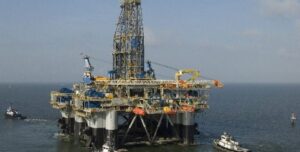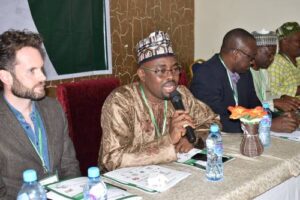By Suraj Olarewaju


Introduction: An Appreciation
Friends, colleagues, comrades, gentlemen and ladies, let me start this address by stating from inception that this meeting is scheduled mostly to be a special get-together to thank you all for your unwavering support, unalloyed fidelity and indeed staunch cooperation as our organization, HEDA Resource Centre and its leadership went through an unprecedented series of persecution, harassment and attacks from forces of corruption within and outside the Governments. We were able to withstand the storm, many thanks to your moral and media supports.
Many of you staked your reputation to defend us; some of you put your careers on the line to stand by us; many of you stood against friends and allies in defence of the truth and justice that HEDA and its leadership stand for; some of you heavily invested your social capital to ensure that HEDA Resource Centre and its Chairman were able to survive the attacks. Indeed, your tenacity paid off and we survived; we just cannot thank you enough.
However, since we had this parley during the peak of the storm, we owe it a duty to you to provide this feedback once again, now that the tension has been doused. We must share with you the full story and how it ended, beyond what you read in the news and more importantly for the purpose of learning as we all go on as usual in the venture of exposing the enemies of our country, standing for justice, promoting human rights, campaigning for sustainable development and indeed deepening and consolidating Nigeria’s democracy. To this extent, we must also use the opportunity of this parley to look at ways of ensuring that anti-corruption crusaders – activists, journalists and whistleblowers – are protected against the powerful forces corruption when they fight back.
What really happened?
It is no news that the persecution of our organization and its leadership is centered on our activities – including statements, petitions, litigations and international escalation – of the issues and persons involved in the OPL 245 Malabu Scandal. As a result, we were stalked, harassed with Police, persecuted with frivolous litigation and even when we were vindicated by the Court, we were physically attacked. Clearly, our traducers would stop at nothing until they land in jail! This is the summary! However, we must provide you with some details that you may not be able to read in the news.
What is OPL 245, what are the scandals surrounding it and who are the perpetrators?
The Oil Prospecting Licence (OPL) 245 is the oil block containing the largest deposit of both oil and gas in Sub-Saharan Africa. The block, considered the richest in Africa, is estimated to contain over 9 billion barrels of crude and even larger volume of gas reserves. OPL 245 alone can provide all Nigeria’s oil production needs for over a decade. The block was awarded on April 29, 1998 by the Sani Abacha government to Malabu Oil & Gas Ltd with a signature bonus of $20 Million.
The OPL245 licence was issued under the Indigenous Concession Programme (ICP), launched by the FGN in 1991 to encourage Nigerian companies to play a role in the country’s oil industry in view of local entrepreneurial development. The licence ought to be for a company with the financial capacity to undertake the exploration and exploitation of the OPL245 field as well as company with experience and profile for sustainability. However, the OPL245 licence was issued to Malabu Oil and Gas, a company that was formed just nine days before the issuance of licence.
Dan Etete, being the Petroleum Minister who oversaw the process was the second largest shareholder in the company that got the contract while Mohammed Sani Abacha whose father was the president that awarded the contract had the largest shareholding in the company that won the award. OPL245 was awarded to Malabu “against all known Government regulations” and “before a formal application was submitted by the company,” the EFCC noted.
Since its award, the oil block has change hands from Malabu to oil giants Shell and Eni; and currently in the hand of the Nigerian government due to various struggle for control, legal battles as well as scandals.
Ultimately, through a mediation process overseen by Mohammed Adoke, Shell and Eni agreed to pay the sum of $1.3 Billion as the price of the bock and signature bonus which was transferred to an escrow account opened by the Nigerian Government with JP Morgan in London. This meant that, $1.092 Billion was paid to the company, Malabu as compensation (actually bribe to Dan Etete and his Cronies, according to EFCC), while the Federal Government earned the $207 Million Signature Bonus.
In the end, while there are litigations on some of the money, amounting to a total of $290 Million; again based on advice given by the then Attorney General of the Federation, Mohammed Bello Adoke to JP Morgan , the London Bank which was to transfer the money, the remainder of $801 Million was controversially transferred to Malabu from the Escrow account.
At the expense of Nigeria, only a few individuals shared the proceeds of corruption, the $801 million received by Etete’s Malabu. “Mr. Etete would later transfer more than half of this sum into accounts of phoney companies controlled by Aliyu Abubakar, a man believed to have acted as a front for politically exposed persons including Mr. Jonathan and his Attorney General, Mohammed Adoke, as well as Shell and Eni staff.” Mohammad Bello Adoke who helped to actualise the payment to Malabu received some $2 million from the deal, according to Milan judges who adjudicated on one of the cases around the scandal.
“This corrupt deal deprived Nigeria’s people of a sum worth 80% of its 2015 healthcare budget.” All actors named in the scandal, including Mohammad Bello Adoke abused their office to benefit from the largesse. DO you now understand why we have a duty to expose all the perpetrators of the scam?
Why are Adoke and his cronies after us?
Our organisation remains a leading voice in exposing the perpetrators of this scam as well as escalating the issues locally and internationally. We owe this to the support of all our international partners. Unfortunately, Adoke must have felt personally pained by our anti-corruption campaigns on this issue, perhaps because he remains the leading force of corruption in fighting back.
Adoke by his own admission in his burdensome memoir, Burden of Service, acknowledged that he oversaw the deal. However he has been indicted by the Milan Court of benefitting in the proceeds of crime to the tune of over $2 million. He has been indicted to have instructed the payment to Malabu even while he was no longer Attorney General. He has been indicted to have used the email address: [email protected] belonging to the company owned by Abubakar Aliyu as well as telephone calls to communicate with JP Morgan Chase Bank in giving the payment instruction. His relationship history with Abubakar Aliyu, a man who is known as Mr Corruption, has been highlighted by investigators among others.
All these are well established facts which we have previously shared with you and many are online and just a Google search away. These established facts – established by local and international law enforcement agencies as well as the Courts of Law in Italy and the UK – are the things that Adoke wants to hide. So, our offence is not that we were saying any new thing, but that we were sharing these established fact so that more people, especially Nigerians who are most concerned would know.
Just as we have networks and partners in the civil society and the media, so also do the corrupt class. Adoke rallied round his colleagues in and out of government to accuse us of circulating fabricated evidence against him to unduly incriminate him in the multi-million dollar scandal. Hence he petitioned the Police to investigate the matter. One of the alleged fabricated information, according to the former Justice Minister Adoke is the email which was tendered as exhibit in trial of the OPL245 scam in Milan Court. The email, obtained by the Milan Prosecutor through a Mutual Legal Assistance request to the United Kingdom, was sent from ‘[email protected]’ to Bayo Osolake, an employee at JPMC. I am sure we detailed this in our last parley, so, I will not bore you with it. But the bottom line is that, Adoke claimed that we fabricated information against him. But on the 28th of February this year, before the UK court in London, Mr. Bayo Osolake of the JP Morgan Chase bank testified in the open court and reaffirmed the email was sent to him by Mr. Bello Adoke who had called him on the phone the day before that email was sent.
The arrest and concocted report of the Police IGP Monitoring Unit
Following Adoke’s complaint as earlier mentioned, despite providing this information, which we believed should have enabled the police to rapidly dismiss Mr Adoke’s complaint, one month later, I received a request from the IGP Monitoring Unit to visit the IGP office in Abuja for interview. I was initially detained, then released on bail. Since then, I was interviewed over six times by the IGP Unit in Abuja at my and my organisation’s expense and with support from our donor partners. Despite trusting in the police to do some basic diligent investigation at the least, our concerns that there was an attempt to manipulate Police procedures was confirmed as the Police IGP unit released a concocted report of a fictitious investigation that failed to establish forgery as alleged by Adoke or even contact the Italian authority but rather advise the Attorney General, Abubakar Malami to prosecute me. You all know the rest of the story. Of course, the purpose of such manipulation would be to intimidate and silence us. Unfortunately for them, we were undeterred and even when they control the machinery of Justice and the State, it still ended in defeat against them!
How prosecution of Olanrewaju Suraju ended in premium tears for the Adokes
You may not read this in the media, but let me give you the gist.
When I was arraigned, not only that the case was adjourned up to three times simply because the prosecution, Mr Malami, the Attorney General, failed to present evidence. The prosecution then amended its charges but again could not go on until it eventually withdrew the charges and the case struck out by the court. Why did the prosecution withdraw?
The Nigerian government has sued JP Morgan Chase Bank over the payment of $801million to Malabu from the account that belongs to Nigeria and because of that JP Morgan was actually the one that brought the email which Adoke claimed was forged. “It was brought by JP Morgan Chase to court and the tape was presented to court by the Italian Prosecutor and accepted as evidence by Italian judge. The Nigerian government has gone contrary to what they said here and in the UK court, to say that email was authentic and legitimate. Some of you might remember we had written a letter to Malami, warning him of the implications of any against us in Nigeria for their case in London.
So it was in that instance we challenged them that this is what you are saying in the UK court and you are saying that same thing was forged in Nigeria. JP Morgan’s lawyer in London brought it up and said the Nigerian government was not credible by coming to say those documents are authentic because the same documents are actually being used to prosecute me in Nigeria. The UK-based Nigerian lawyer said that the charges filed in Nigeria were at the compromise of DPP’s office by Adoke and it was not the Nigeria government. He pleaded there on February 28 in London court that the charges will be withdrawn.
You know falsehood has its limits, even before the date of hearing, I had no doubt that the prosecution would have no choice but to withdraw the case. It was all hypocrisy in the first place. The conspiracy between the two corrupt Attorneys General failed. So, we became victorious and vindicated.
What does this mean for activists, whistleblowers, journalists and the likes?
While I was able to scale through this, thanks to a very senior lawyer who even had to use his personal money to secure the bail. Also, thanks to deep and wide network which are born from years of working on anticorruption campaigns. How do we protect the younger ones or even those who may not have the resources to hire senior advocates like we did or rally network of civil society like we did or even afford the costs of persecution – frequent expensive travel to Abuja, risks to close allies and families etc? How do we protect the rest of us as corruption continues to fight back?
I think one key task we need to focus on is how to stop impunity: the culture of acting without fear of or expectation of consequence. It is impunity that made Adoke give instructions that shortchanged the country by over a billion dollars even when he was not in office; it is the same impunity that embolden the conspiracy that led to the frivolous suit against me; it is the same impunity that is playing out with the CBN governor and partisan politics; it is the same impunity that is brightening the chance of Malami and their likes who want to remain Ministers while contesting elective offices; impunity is the reason why journalists, whistleblowers and activists who are attacked never get justice. How do we stop this impunity? How do we protect human rights defenders?
Finally, given what June 12 represents in Nigeria’s history in terms of struggle for democracy, campaign against corrupt practices, impunity and activism for development, we hope that we can use this opportunity to discuss some of our challenges and lessons in the course of campaign for good governance and human rights and particularly looking at how we can stop corruption and impunity as well as ensure protection for human rights activists.
In the last few months, our biggest lesson is to fight on no matter what!
We hope to learn from your comments and I thank you for listening!
Olanrewaju Suraju,
Chairman, HEDA Resource Centre.















